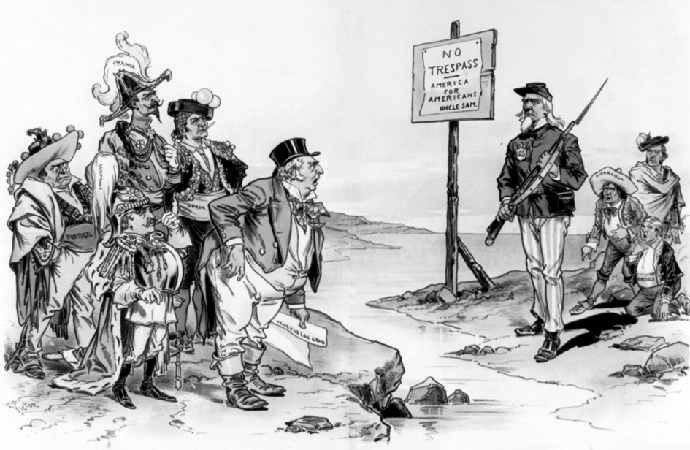The Monroe Doctrine was pronounced in 1823, first in a letter to Russia, whose ambassador suggested that its holdings in Alaska might expand down the West Coast into what is now California but was then part of Mexico. It was also prompted by a suggestion by France, which had invaded Spain, that it wanted to recolonize countries in the Americas that had become independent. The original doctrine, included a commitment to stay out of European conflicts. Things evolved. The policy expanded into a US claim to determine the affairs of Latin American and Caribbean lands. The bit about the United States staying out of Europe’s wars was dropped. The Monroe Doctrine is a shifting US policy, not a principle of law.
The Monroe Doctrine and
Mr. Bolton’s regional wars
by Marco A. Gandásegui, hijo
The Monroe Doctrine was formulated in 1823 by the US secretary of state at the time, John Quincy Adams, and directed at European powers. It explicitly said that any intervention by them in the Western Hemisphere would be considered an offense against the integrity and sovereignty of the United States. In effect, the United States reserved what later became Latin America as its own territory. All of the US governments of the 20th century made it clear that this most expansive interpretation of the doctrine was no longer in effect. Until now.
The Panamanian governments have perhaps been the most affected by the US territorial claims. The 20th century was a permanent struggle to exercise sovereignty over the entirety of its territory, despite the American power that occupied a strip of 500 square miles across the Isthmus of Panama. The Monroe Doctrine was complemented by the corollary of Theodore Roosevelt which is synthesized in his famous cry: “I took Panama and let Congress debate.” The president-elect, Laurentino Cortizo, must have this historical background in mind when he assumes power in about 10 days.
President Donald Trump’s national security adviser just said that “today we proudly proclaim so that everyone can hear: the Monroe Doctrine is alive and well.” It is another moment, different from 1823, when Washington looked towards Europe. Bolton looks at China, a new emerging Asian power, which has a growing economic presence in Latin America and, in particular, Panama. American politicians have always considered, and so they say, that the continent is their “back yard.” Recently, US Vice President Mike Pence said that his country can not intervene in any country in the world, with the exception of those in Latin America.
In the early nineteenth century the official US policy consisted of preserving the status quo when it came to relations with Spanish America. When the Venezuelan generals Francisco Miranda and Simón Bolívar, at different times, asked Washington for support for the revolutionary struggles for the independence of the region, the United States declared itself neutral. In spite of this, it sold arms to the Spanish Crown to suppress the uprisings from Mexico to Argentina, including through Greater Colombia. The Monroe Doctrine was made known in 1823, four years after the Angostura Congress, two years after the independence of Panama and a year before the battle of Ayacucho sealed the triumph of the independence armies. It was three years before the Amphictyonic Congress summoned by Bolívar in Panama City.
The US plan, announced by President Jefferson in the early nineteenth century, was to wait for each Spanish colony to fall like ripe fruit for Washington to harvest, without firing a shot and without bloodshed. He bough the Louisiana Territory from France in 1803, which included the huge Mississippi River watershed. It was expected that the rest of the region would be under US control. Although northern Mexico was later taken, the plan did not develop as expected. From the end of the 19th century, the USA found the formula to appropriate the natural riches of the region without the need to annex the Latin American territories (with the exception of Puerto Rico).
In the case of Panama, the United States is interested in retaining its dominance over the transit route that joins the Pacific and Atlantic oceans. All US maritime trade from one ocean to the other passes through the Panama Canal. It is a place of great geopolitical importance. The United States wants neither Panama, nor regional movements, let alone extra-regional factors, to destabilize the correlation of forces. It is no accident that Bolton seeks refuge in the Monroe Doctrine to wage war on what the United States considers its “back yard.”
These links are interactive — click on the boxes













